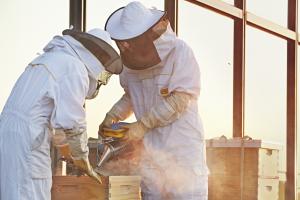The Best Bees Company Delivers ESG Tools to Help Sustainability Leaders Contribute to a Green Future
Best Bees delivers two new tools that link honey beehive initiatives to corporate sustainability efforts
BOSTON, MA, USA, September 8, 2021 /EINPresswire.com/ -- The Best Bees Company, an Ecosystem Services provider named one of the fastest growing companies last year by Inc. Magazine, has developed new tools to help sustainability professionals take concrete steps toward implementing pollinator programs that are connected to strategic objectives:
1. “Bees for ESG Impact” is a new report detailing how Best Bees’ unique approach to managing honey beehives helps companies meet U.N. Sustainable Development Goals (UN SDGs).
2. “On-Premise Pollinator Habitats,” is an accredited course available on the US Green Building Council’s education platform. The one-hour video course informs green building and landscape design professionals about the impact of installing honey beehives.
With these new tools, corporate real estate developers and owners, property managers, and green building professionals learn state-of-the-art best practices for adding honey beehives to their properties. The key is in Best Bees’ unique approach to scientifically managing its nationwide network of beehives. Best Bees beehives have a direct impact on organizations’ ESG (environmental, social, and governance) targets and overall sustainability initiatives because its hive data is collected and analyzed at scale.
“Businesses are under more pressure than ever to find ways to support corporate sustainability targets, align with global goals, and make an impact,” said Noah Wilson-Rich, Ph.D., co-founder and CEO of The Best Bees Company. “Any effort toward biophilia and environmental resilience is a step in the right direction. But because The Best Bees Company adheres to a scientific approach, each of our honeybee hives is a living data factory. Corporations make an outsized impact on their sustainability initiatives by joining The Best Bees Company’s network of data-yielding beehives.”
Corporate Pollinator Programs On the Rise
Increasingly, organizations including EMD Serono, Jamestown, and Beacon Capital Partners are bringing honeybee hives to their properties as part of a broader sustainability program. EMD Serono, the healthcare business of Merck KGaA, Darmstadt, Germany, worked with The Best Bees Company to implement beehives on its Boston Metro campus three years ago. Today the company’s pollinator program features three hives, wildflower gardens, and grasses that require minimal weekly maintenance and no pesticide use.
“We believe sustainability and wellness go hand-in-hand,” said Jeff Hyman, Associate Director, Environment Health and Safety US at EMD Serono. “We want to offer our employees a great environment inside and out. That includes green buildings that have earned the highest LEED and WELL ratings, and a pollinator- and wildlife-friendly landscape that invites everyone to enjoy nature.”
Networked Beehives Support 10 SDGs: A White Paper
The Sustainable Development Goals (SDGs) established by the United Nations are helpful reference points for organizations setting and measuring Environmental, Social, and Governance (ESG) targets. Through its report, “Beehives for ESG Impact,” The Best Bees Company offers organizations a framework to map a honeybee program to the global SDG goals. The guide details scientific evidence for how a network of data-yielding honeybee hives supports 10 of the UN’s SDGs. It shows that honeybees managed with research in mind are surprisingly efficient cross-target investments.
Jamestown LP, a design-focused real estate investment and management company, is partnering with The Best Bees Company to install honey-producing hives on a number of its properties across the country. Michael Phillips, president of Jamestown, said, “Pollinators are essential for the future of our planet. Expanding our beekeeping programs across our portfolio is one component of our effort to power a greener future.”
Green Building Professionals Learn About Bees and LEED and SITES Points: An Accredited Continuing Education Course
As the interest in biophilia and environmental resilience grows, The U.S Green Building Council (USGBC) is keeping pace with education, certification and credentialing. The course “On-Premise Pollinators” is the first of its kind for green building and landscape design professionals who want to learn how to install an on-premise pollinator habitat, as well as the benefits of doing so. The Green Building Council (GBCI) has certified a continuing education credit for the course, which is offered to the USGBC community at usgbc.org.
For practicing professionals seeking LEED and SITES certification, USGBC and GBCI award up to 7 LEED points, and up to 12 SITES points, for adding a pollinator habitat to a commercial building.
For more about The Best Bees Company and its CEO Noah Wilson-Rich, Ph.D., visit bestbees.com.
Susan Rozmanith
The Best Bees Company
+1 781-771-7211
email us here
Visit us on social media:
Facebook
Twitter
LinkedIn
Legal Disclaimer:
EIN Presswire provides this news content "as is" without warranty of any kind. We do not accept any responsibility or liability for the accuracy, content, images, videos, licenses, completeness, legality, or reliability of the information contained in this article. If you have any complaints or copyright issues related to this article, kindly contact the author above.

